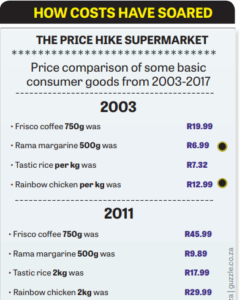21.8.2017 06:30 am
Brendan Seery

PUSHING IT. One of the reasons you are paying more, trolley for trolley, is the constantly rising fuel price. Picture: Refilwe Modise
Do you remember what margarine and coffee cost in 2003? It’s enough to make you cry.
Food prices have spiralled shockingly in the past 10 years and millions of consumers are feeling the pinch.
Price inflation in the food category has been one of the main drivers in the overall inflation rate in the country. In June this year, food price inflation stood at 6.9%, considerably higher than the overall inflation rate of 6.1%.
In the past five to 10 years, food price inflation has consistently driven overall inflation and, in some months, hit as high as 20%.
Things got a lot worse during the recent drought, which is said to be over in the summer rainfall areas (where maize and cattle are the main commodities), but is still strangling the winter rainfall areas of the country, where the majority of our wheat and fruit is produced.
This year, the Pietermaritzburg Agency for Community Social Action (Pacsa) released its food barometer for January, which showed that prices in a “nutritional basket” of food items had increased by 16.5% in the past year.
Although the Pacsa food basket is biased towards the lower end of the market, its figures showed than even some basic foods have increased well above the inflation rate.
Earlier this year, The Citizen reported that South Africa was expected to harvest 15.969 million tons of maize this season, breaking the 1981 record of 14.656 million tons, and that this could significantly bring down food prices.
However, the bad news is that the reduction will only be felt by next year and that in the interim, some foods – like meat and eggs – could actually go up in price.
In May, the South African Poultry Association warned consumers of an increase in the egg price. The association said last year was difficult for egg producers because of increased feed prices due to the drought.
Charlotte Nkuna, senior executive at the association, was quoted as saying that “consumers can expect an increase in egg prices due to a shortage on the market.
The indications are that prices are likely to increase on average by about 7%-8%.
This scenario is likely to persist while farmers attempt to increase their production to meet the market demand.”
Experts said the egg price would become problematic and would likely hit the middle class hard. Eggs have been a cheaper source of animal protein than competing foods such as meat and there has been a swing towards them in urban consumption.
This change in consumption habits has, therefore, increased the demand for eggs. Another reason for increasing food prices has been transport costs.
Fuel prices have spiralled in the past 15 years, driven by the collapse in the value of the rand and by international oil prices. Most major retailers have passed along transport cost increases to customers.
Transport costs in Gauteng, particularly, have been exacerbated by the e-toll fiasco, which has added significantly to the cost of doing business for those hauliers operating in the province.

.

.
– news@citizen.co.za

